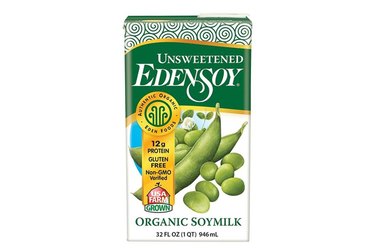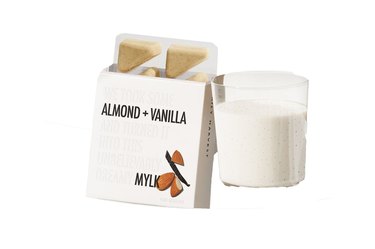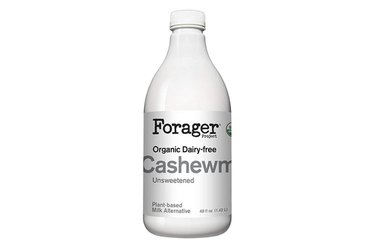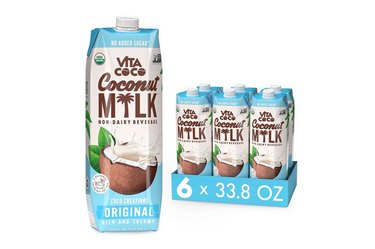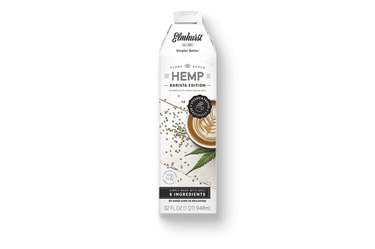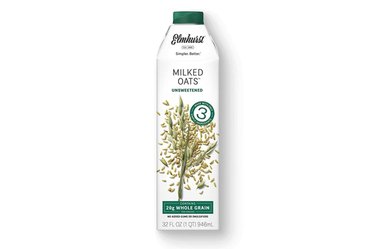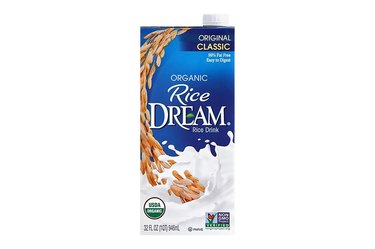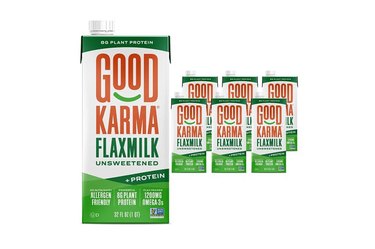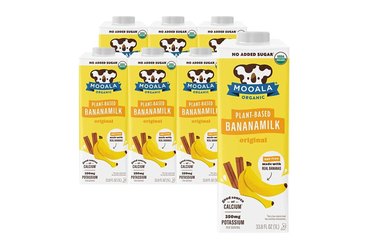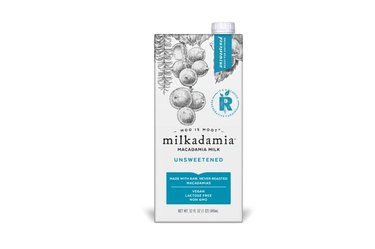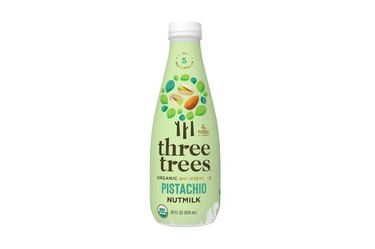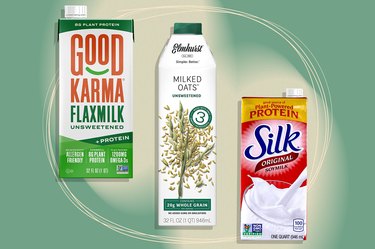
If you have lactose intolerance or steer clear of dairy for other reasons, you may be among the growing number of folks turning to milk alternatives. Fortunately enough, there's a near-endless variety to be found in your local grocery store.
But of course, the sheer amount of options can also make it hard to know which one is right for you. While your tastebuds play a big role, there are some nutritional differences you should keep in mind as you're filling your cart.
Video of the Day
Video of the Day
What Is a Milk Alternative, Anyway?
"A milk alternative is simply a substitute for milk, produced from a plant, nut or other substance and/or a milk product where lactose has been removed or denatured," Allison Baker, RD, LD, director of nutrition for Kroger, tells LIVESTRONG.com.
Many cartons for dairy alternatives bear the word "milk" on their labels. But the wording is up for debate: The U.S. Food and Drug Administration (FDA) is considering updating labeling practices for plant-based milk alternatives.
The Definition
“Milk” is a substance that comes from an animal — not a nut, fruit or any other plant-based food, per the FDA definition. This means you may see "almond beverage" or "coconut beverage" on milk alternative labels.
Regardless of what they're called, these blends can be a nutritious addition to your diet, Baker says. A few reasons to opt for non-dairy milk are:
- Allergies: This is a "major reason" people might opt for non-dairy milk, says Lauren Manaker, RD, a Charleston-based dietitian and author of The 7-Ingredient Healthy Pregnancy Cookbook. "People with a milk protein allergy will need to avoid all milk proteins, so an alternative beverage can help fill the void of what they are missing," Manaker says.
- Lactose intolerance: Many people have lactose intolerance, which can make milk hard on your digestive system. Some people may find that non-dairy milk options more tolerable for their body, Manaker says.
- Dietary preferences: If you follow a vegan diet, dairy milk is a no-go. Religion can also be a factor. "People who follow a Kosher diet, and therefore don't eat milk products with meat products, may enjoy non-dairy milk alongside their protein to continue to be compliant with the guidelines while still enjoying milk," Manaker says.
- Fewer trips to the grocery store: Many non-dairy milks are shelf-stable until the container is opened. Plus, unopened non-dairy milks typically have an expiration date that's months out. That's unlike dairy milk, which typically expires in a few weeks.
"Different people have different needs, so there is no perfect guideline to follow when choosing non-dairy milk products," Manaker says. That said, Manaker recommends looking for products that are:
- Low in added sugar
- Offer some protein
- Are enriched and have similar micronutrients to dairy milk (think: calcium and vitamin D)
Here are the best milk alternatives and brands to buy.
Related Reading
1. Best for Protein: Soy Milk
One cup of soy milk has the following nutritional breakdown, per the USDA:
- Calories: 80
- Fat: 3.9 g
- Saturated Fat: 0.5 g
- Sugar: 1 g
- Protein: 6.9 g
Soy milk is the original milk alternative. After all, this soybean-derived beverage has been a mainstay in plenty of kitchens for decades — specifically, in Central and South American households. As well as being widely enjoyed around the world, it's typically the least expensive milk alternative, says Philip Goglia, PhD, chief medical officer and co-founder of health technology company G-Plans.
Soy milk is a low-saturated-fat alternative to milk that contains both mono- and polyunsaturated fats, both of which work to decrease inflammation and lower cholesterol levels, Goglia says.
It's also noteworthy for its high concentration of protein, which is comparable to what you might find in a traditional glass of cow's milk.
Soy is also high in isoflavones, which can act like estrogen in the body. While some animal research has linked high doses of this compound to an increased risk of breast cancer, a growing body of evidence suggests that soy is safe for people to eat, according to the American Cancer Society. A moderate amount, as in one to two servings a day, does not increase the risk of breast cancer or any other type of cancer, according to the Mayo Clinic.
Try It
- Eden Foods Organic Unsweetened Edensoy ($42.99 for twelve 32-ounce containers, Amazon.com)This is made using only soy and water, says Amy Shapiro, RD and founder of Real Nutrition. She describes it as a “minimal ingredients win.” And because it’s shelf-stable, you can keep it out of your fridge until it’s open.
- Silk Soy Milk, Original ($56.27 for twelve 32-ounce containers, Amazon.com) A 1-cup serving offers 7 grams of protein, or 14 percent of the daily value (DV). It also has 45 percent of the DV of calcium — that's more than a comparable amount of skim milk, which contains 23 percent of the DV of calcium, per the USDA.
2. Best for Weight Management: Almond Milk
One cup of unsweetened almond milk has the following nutritional breakdown, per the USDA:
- Calories: 39
- Fat: 2.5 g
- Saturated Fat: 0.2 g
- Sugar: 2.1 g
- Protein: 1 g
With less than 40 calories per serving, almond milk is a solid choice for those who are tracking what they eat and hoping to shed a few pounds, Baker says. It's also an ideal option for baking in place of regular milk, as it provides a subtle, nutty flavor.
Almond milk also has vitamin A and other antioxidants, which help your body gobble up free radicals that cause inflammation, says Heather Hammerstedt, MD, MPH, CEO of Wholist Health.
On the other hand, almond-based beverages typically don't offer much fiber because they're mostly made of water, and they tend to be very processed in an effort to remove the skin of the almond. Sadly, Hammerstedt says, it's the outer part of the almond that has the most nutritional goodness.
Check the label before purchase, as many varieties contain added sugar, Hammerstedt says. Opt for a plain or unsweetened variety, and spring for organic if you can. Or, try making your own almond milk at home.
Try It
- Daily Harvest Almond Mylk ($7.99 for ~1/2 gallon, DailyHarvest.com)This almond milk requires some assembly — to make it, you’ll blend two wedges of the concentrated product with water. It comes recommended by Shapiro, who appreciates that it’s made with only three ingredients with no fillers added. Plus, it comes in completely compostable packaging.
- Silk Shelf-Stable Almond Milk ($29.00 for a pack of 6 quarts, Amazon.com) Manaker recommends this brand's almond milk, which is made by a certified B corp. If you can, look for Silk's Unsweet Extra Creamy Almond Milk. Manaker says this particular variety is "just as satisfying as dairy milk, but free from any animal products."
3. Best for Dairy-Free Cooking: Cashew Milk
One cup of unsweetened Forager cashew milk has the following nutritional breakdown, per the USDA:
- Calories: 100
- Fat: 9 g
- Saturated Fat: 6 g
- Sugar: 1 g
- Protein: 2 g
Unsweetened cashew milk offers a creamy and rich consistency, Serena Poon, celebrity chef and nutritionist, tells LIVESTRONG.com. That makes it an excellent base for ice cream, creamy sauces and vegan cheeses, Poon says.
It can also provide a bit of iron. For instance, the Forager Project brand has 6 percent of your DV of iron.
Cashew milk can be a pricey option. And if you're weight-conscious, cashew milk might not be your best bet, either, as it's relatively calorie-dense.
Try It
Forager Project Organic Unsweetened Plain Cashewmilk ($5.99, Freshdirect.com)
This organic unsweetened cashew milk offers a creamy texture and delicious taste. It contains a few added ingredients: coconut cream, tapioca starch and gluten-free oats.
4. Best for Active People: Coconut Milk
A 1-cup serving of Vita Coco Original Coconut Milk has the following nutritional facts:
- Calories: 50
- Fat: 3 g
- Saturated Fat: 2.5 g
- Sugar: 3 g
- Protein: 0 g
When it comes to coconut milk, you've got several options. In its undiluted canned form, it can add creaminess to dishes such as curries or soups. If you want to drink it, like you would a glass of dairy milk, opt for one of the diluted versions (typically found in a carton in the refrigerated section of your supermarket) or add water to the product in the can.
This tropical-tasting beverage is higher in fat than other plant-based milks, and typically has no protein. Coconut milk contains potassium, an electrolyte that supports hydration as well as your body's nerve and muscle functions, according to the University of Michigan Health.
Be on the lookout for added sugars and other additives on the label. And keep in mind that the nutrition facts vary from one brand to another.
Try It
Vita Coco Original Coconut Milk ($19.99 for six 33.8-ounce containers, Amazon.com)While this option has more ingredients, you may appreciate that you can pour it directly out of the container, with no need to mix or dilute it. That said, it's not a good source of calcium — 1 cup contains just 4 percent of your DV of calcium.
Native Forest Simple Organic Unsweetened Coconut Milk ($14.99 for three 13.5-ounce cans, Amazon.com)This one comes in a can, so you’ll want to dilute it with water, Shapiro says. She likes that it’s made from only two ingredients: water and coconut. It’s rich and creamy.
5. Best for Vegans: Hemp Milk
One cup of Elmhurst Barista Edition Hemp Milk has the following nutritional information:
- Calories: 130
- Fat: 6 g
- Saturated Fat: 1 g
- Sugar: 4 g
- Protein: 3 g
Hemp milk is a great milk alternative for vegans, vegetarians and folks who don't eat fish.
That's because it's a complete protein (that's rare in plant-based foods), according to the American Society of Nutrition. Hemp milk is a good source of omega-3 fatty acids, which are essential fats that promote heart health and normal brain function, according to the Harvard T.H. Chan School of Public Health. Omega-3s are particularly important if you're vegan or vegetarian because fish is one of the leading sources of these fats.
Hemp milk is also high in calcium, per Edward-Elmhurst Health.
Try It
Elmhurst Barista Edition Hemp Milk ($42.99 for a six-pack of 32-ounce containers, Amazon.com)
Shapiro describes this beverage as being “delicious and as clean as you can make it unless making your own.” The ingredients are “far and above” ones from other brands, she says. “They stay clear from carrageenan and other gums and emulsifiers, which helps it stand in its own category.”
6. Best for Fiber: Oat Milk
One cup of Elmhurst Unsweetened Oat Milk has the following nutritional breakdown:
- Calories: 80
- Fat: 1.5 g
- Saturated Fat: 0 g
- Sugar: 1 g
- Protein: 4 g
Nutritional information can vary from one brand of milk made from oats to another. Made of whole oats, this milk alternative is high in essential B vitamins and a solid source of calcium and vitamins D and A, says Goglia.
It has a similar flavor and consistency to regular milk, making it one of the best-tasting milk alternatives. One big advantage oat milk has over other options, like almond and rice, is its plentiful amount of fiber — 2 grams per cup — which helps to lower cholesterol and keep you feeling fuller longer.
But keep in mind that oat milk is relatively high in sugar, calories and carbohydrates, says Audrey Perkins, MPH, a Boston-based nutrition consultant and the health and wellness strategy manager for Ocean Spray.
And while it can be a good option for vegans or those with food allergies — such as nut, dairy or soy allergies — people with celiac disease or gluten sensitivity should be cautious, because oats can be cross-contaminated with gluten.
Try It
Elmhurst Unsweetened Oat Milk ($42.99 for a six-pack of 32-ounce containers, Amazon.com)
Elmhurst is also Shapiro’s preferred brand of oat milk. “It doesn't contain any gums or oils like many traditional oat milks, and doesn't add any sugars,” she says.
7. Best for People With Food Allergies: Rice Milk
One cup of unsweetened rice milk has the following nutritional breakdown, per the USDA:
- Calories: 113
- Fat: 2.3 g
- Saturated Fat: 0 g
- Sugar: 12.7 g
- Protein: 0.7 g
If you have an allergy to nuts or soy, rice milk is a good option, according to Edward-Elmhurst Health.
This low-fat beverage is the most hypoallergenic non-dairy milk, Perkins says. It's also typically enriched with calcium and vitamins A, B12 and D, to name a few. And for those who enjoy the taste of cow's milk but simply can't stomach it, Perkins says rice is your best bet for a substitute.
The bad news? Perkins says rice milk doesn't have a very good calorie-to-protein ratio. "It is very low in protein and high in calories as well as carbohydrates."
Try It
Rice Dream Organic Rice Drink ($39.01 for a pack of twelve 32-ounce containers, Amazon.com)
This organic beverage has a short list of ingredients and tastes good.
8. Best for Omega-3s: Flax Milk
A one-cup serving of Good Karma Flaxmilk + Protein has the following nutrition facts:
- Calories: 70
- Fat: 3 g
- Saturated Fat: 0 g
- Sugar: 0 g
- Protein: 8 g
"Flax milk naturally contains omega-3 fatty acids, making it a great choice for people following a plant-based diet," Manaker says. These essential fatty acids are key for the function of many organs and systems in your body, including your heart and immune system, according to the National Institutes of Health (NIH). This type of milk is also naturally cholesterol-free, Manaker says. Plus, it "tastes great," she adds.
Try It
Good Karma Flaxmilk + Protein ($29.99 for a pack of six 32-ounce containers, Amazon.com)
Manaker recommends Good Karma flax milk for its high amount of protein (8 grams per cup).
9. Best for Smoothies: Banana Milk
One cup of Mooala Organic Original Bananamilk has the following nutritional breakdown:
- Calories: 60
- Fat: 3 g
- Saturated Fat: 0 g
- Sugar: 4 g
- Protein: 1 g
Kids may love this type of milk, Manaker says. Mooala's banana milk is "made with just banana, water and sunflower seeds," she says.
Warning: If you don't like the taste of bananas, you won't enjoy this milk. "This is a fantastic addition to any smoothie recipe that uses bananas as a base, as it helps enhance that delicious flavor," Manaker says.
Try It
Mooala Organic Original Bananamilk ($29.95 for a six-pack of 1-liter containers, Amazon.com)
10. Best for Frozen Desserts: Macadamia Nut Milk
A 1-cup serving of milkadamia Macadamia Milk has the following nutrition facts:
- Calories: 40
- Fat: 3.5 g
- Saturated Fat: 0.5 g
- Sugar: 0 g
- Protein: 1 g
You'll get a rich and satisfying taste with macadamia nut milk, Manaker says. The milkadamia brand take on macademia milk is made from raw nuts, along with pea protein and other ingredients.
"This nut milk is a great option as an ingredient in homemade dairy-free ice creams and frozen desserts, thanks to the natural richness and appealing consistency," Manaker says.
Try It
milkadamia Macadamia Milk ($11.49 for six 32-ounce containers, Amazon.com)
11. Best in Coffee or Cereal: Pistachio Milk
One cup of Three Trees Pistachio Nut Milk has the following nutrition facts:
- Calories: 100
- Fat: 8 g
- Saturated Fat: 1 g
- Sugar: 1 g
- Protein: 4 g
If soy milk is one of the oldest dairy-free alternatives, pistachio milk may be one of the newest. The first pistachio milk for sale, from the brand Táche, entered the scene in fall 2020. It has a naturally sweet taste, Shapiro says.
For that reason, she recommends adding it to lattes or coffee beverages, as well as oatmeal or cold cereal. While it tastes sweet, it has only a gram of sugar.
Nutritionally speaking, it's high in protein for a non-dairy milk (although still contains far less protein per cup than soy milk). And it has fewer calories than some other milk alternatives (such as soy, rice and some other nut milks). Because it's a relatively new entry to the milk alternative marketplace, it may be less available than other options.
If you can't find pistachio milk in stores, your next best option is oat milk for coffee and cereal.
Try It
Three Trees Pistachio Nut Milk ($6.99, select Whole Foods stores)
This is Shapiro’s favorite brand because it’s free from additives and gums. “The flavor is naturally sweet and it contains antioxidants.” Note that this variety of pistachio milk has almonds in it as well.
The nutritional profile is different from the Tache brand, mentioned above: Three Trees pistachio milk has more protein, but more calories and fat as well.
- Harvard T.H. Chan School of Public Health: "Omega-3 Fatty Acids: An Essential Contribution"
- American Cancer Society: "Soy and Cancer Risk: Our Expert’s Advice"
- Mayo Clinic: "Will eating soy increase my risk of breast cancer?"
- U.S. Food and Drug Administration: "Foods Program Guidance Under Development"
- FDA: "CFR - Code of Federal Regulations Title 21"
- USDA: "Urban Remedy - Cashew Milk"
- University of Michigan Health: "Potassium (K) in Blood Test"
- American Society of Nutrition: "Going nuts about milk? Here’s what you need to know about plant-based milk alternatives"
- Edward-Elmhurst Health: "Choosing the right milk for you"
- USDA: "Unsweetened Rice Milk"
- USDA: "Soy Milk"
- Táche Unsweetened Original Blend:
- USDA: "Skim Milk"
- National Institutes of Health: "Omega-3 Fatty Acids"
